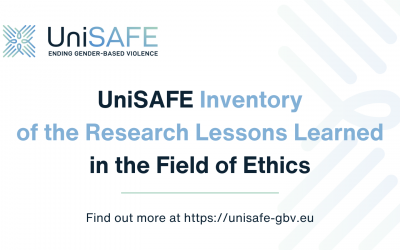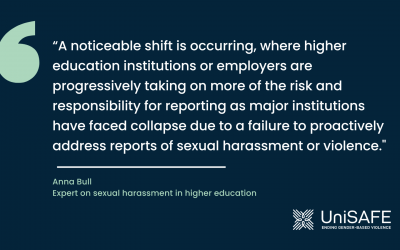Following the mapping of organisational level policies and measures adopted to address gender-based violence, UniSAFE has successfully concluded the next step of its research at the organisational level: a multi-level analysis of 16 case studies.
The objective is to offer a comprehensive understanding of the effects and consequences of the design and implementation of institutional measures and responses to gender-based violence in research organisations and universities.
Key Findings
The multi-level analysis investigates how institutional measures are implemented by a multiplicity of actors and how they work at the individual level, focusing on the interactions, effects and consequences of each institutional response.
Contexts play a decisive part
Findings show how the societal and institutional context is key for the effective adoption and implementation of institutional responses against gender-based violence. They also identify the crucial importance of counting on the support of the governing bodies and top management of the institution to guarantee a smooth implementation and counteract resistances.
Additionally, the results indicate that institutions still need to make an effort to foster accountability and include monitoring and evaluation mechanisms.
No change is possible without resources
The analysis sheds light on the key role of personal activism and volunteering and/or unpaid work on the part of implementers, which reveals itself as a non-written but widespread institutional strategy to sustain the work against gender-based violence including sexual harassment.
As the majority of the analysed institutional responses lack or have insufficient resources (budget, human resources, proper space and time), their implementation seem to a large extent dependent on the volunteer work of those individuals who are actively involved in combating gender-based violence. It appears that existing institutional responses are intended to address a problem as systemic and structural as gender-based violence yet allocate minimum resources. This is one of the major contradictions in the implementation of the measures analysed and demonstrates the lack of institutionalisation.
The lack of resources allocated to combatting gender-based violence endangers the sustainability of a more in-depth and structural change process towards safer institutions.
Selection of case studies
16 case studies were selected from UniSAFE’s inventory of policies and measures to respond to gender-based violence in European universities and research organisations.
The rationale behind the case studies selection was the geographical coverage of 15 selected countries (EU27 and Associated Countries) and a comprehensive coverage of the 7Ps model with measures for preventing, protecting, prosecuting and providing services, supported by policies and partnership.
Method
Along with the 7Ps theoretical model, the analysis follows Feminist Policy Studies in recognising the importance of paying attention to the post-adoption phases of policy, hence focusing the analysis on the implementation of the institutional responses.
Led by researchers from Universidad Complutense de Madrid and involving researchers from other UniSAFE partners, the methodology applied includes several qualitative methods, namely: document analysis, interviews, focus groups, field diaries and maps of actors. Overall, 100 interviews and 25 focus groups were conducted with 176 participants, and 194 documents were analysed. Our deep gratitude goes out to all participants who gave up of their time to advance research on this topic!
Photo Credit: Across University Square, Birmingham University by Andrew Abbott, CC BY-SA 2.0, via Wikimedia Commons. Birmingham University is not included in the universities involved in this research.



